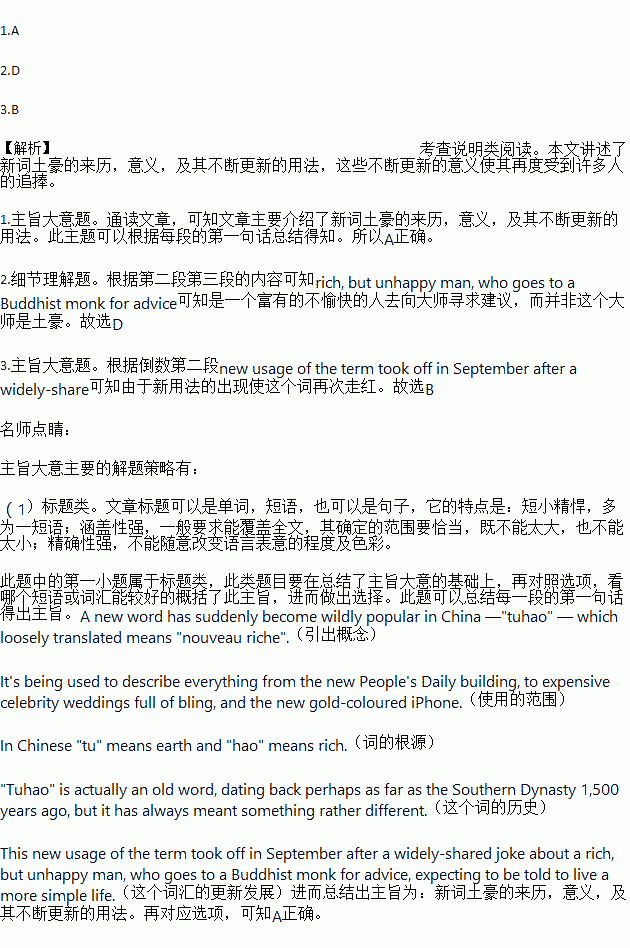题目内容
A new word has suddenly become wildly popular in China —"tuhao" — which loosely translated means "nouveau riche". There have been more than 100 million references to the word "tuhao" on social media since early September.
It's being used to describe everything from the new People's Daily building, to expensive celebrity weddings full of bling, and the new gold-coloured iPhone.
In Chinese "tu" means earth and "hao" means rich. To say someone is tuhao is to imply they come from a poor peasant background, and have made it rich quick — but don't quite have the manners, or sophistication to go along with it. It's like the term "nouveau riche", says Professor Steve Tsang at the School of Contemporary Chinese Studies in Nottingham — but has even more negative meanings, suggesting a certain vulgarity(粗俗).
"Tuhao" is actually an old word, dating back perhaps as far as the Southern Dynasty 1,500 years ago, but it has always meant something rather different. During the communist revolution, from the 1920s to early 1950s, it was widely used to refer to landholders and gentry who would bully those beneath them.
This new usage of the term took off in September after a widely-shared joke about a rich, but unhappy man, who goes to a Buddhist monk for advice, expecting to be told to live a more simple life. The monk replies instead with the phrase: "Tuhao, let's be friends!"
Chinese Internet users are highly creative in their use of language, and are constantly inventing, and re-inventing words as a way of getting past censorship(审查) rules. But in this case, its popularity seems to be down to  the fact that it expresses China's changing society so well — many people sneer at those with wealth, but are secretly jealous.
the fact that it expresses China's changing society so well — many people sneer at those with wealth, but are secretly jealous.
1.What is the best title of the passage?
A. Tuhao, a new popular word in China
B. The long history of Tuhao
C. The new usage of Tuhao
D. Tuhao, a newly-invented Chinese word
2.Which of the following may NOT be considered “tuhao”?
A. A vulgar nouveau riche
B. A bully landholder
C. A quick-rich peasant without proper manners
D. A Buddhist monk.
3.The last but one paragraph mainly tells us ______.
A. what the new usage of the word is
B. how the word becomes popular again
C. why the unhappy man went to the Buddhist monk
D. what advice the monk gave the unhappy man
 阅读快车系列答案
阅读快车系列答案| A. | the; a | B. | the; the | C. | /; a | D. | the;/ |
Everyone in business has been told that success is all about attracting and retaining (留住) customers.It sounds simple and achievable.But,(50)inreality,words of wisdom are soon forgotten.Once companies have attracted customers they often (51)overlook the second half of the story.In the excitement of beating off the competition,negotiating prices,securing orders,and delivering the product,managers tend to become carried away.They forget what they regard as the boring side of business-(52)ensuring that the customer remains a customer.
(53)Failing to concentrate on retaining as well as attracting customers costs business huge amounts of money annually.It has been estimated that the average company loses between 10and 30per cent of its customers every years.In constantly changing (54)markets,this is not surprising.What is surprising is the fact that few companies have any idea how many customers they have lost.
Only now are organizations beginning to wake up to those lost opportunities and calculate the(55)financial
implications.Cutting down the number of customers a company loses can make a big (56)difference in its performance.Research in the US found that a five per cent decrease in the number of defecting (流失的) customers led to (57)profit increases of between 25and 85per cent.
In the US,Domino's Pizza estimates that a regular customer is worth more than $5,000over ten years.A customer who receives a poor quality product or service on their first visit and(58)asaresult never returns,is losing the company thousands of dollars in(59)potential profits (more if you consider how many people they are likely to tell about their bad experience).
The logic behind cultivating customer (60)loyalty is impossible to deny."In practice most companies'marketing effort is focused on getting customers,with little attention paid to(61)keeping them",says Adrian Payne of Cornfield University'School of Management."Research suggests that there is a close relationship between retaining customers and making profits.(62)Established customers tend to buy more,are predictable and usually cost less to service than new customers.Furthermore,they tend to be less price (63)sensitive,and may provide free word-of-mouth advertising.Retaining customers also makes it (64)difficult for competitors to enter a market or increase their share of a market.
| 50.A.in particular | B.in reality | C.at least | D.first of all |
| 51.A.emphasize | B.doubt | C.overlook | D.believe |
| 52.A.denying | B.ensuring | C.arguing | D.proving |
| 53.A.Moving | B.Hoping | C.Starting | D.Failing |
| 54.A.markets | B.tastes | C.prices | D.expenses |
| 55.A.culture | B.social | C.financial | D.economical |
| 56.A.promise | B.plan | C.mistake | D.difference |
| 57.A.cost | B.opportunity | C.profit | D.budget |
| 58.A.as a result | B.on the whole | C.in conclusion | D.on the contrary |
| 59.A.huge | B.potential | C.extra | D.reasonable |
| 60.A.beliefs | B.loyalty | C.habits | D.interest |
| 61.A.altering | B.understanding | C.keeping | D.attracting |
| 62.A.Assumed | B.Respected | C.Established | D.Unexpected |
| 63.A.agreeable | B.flexible | C.friendly | D.sensitive |
| 64.A.unfair | B.difficult | C.essential | D.convenient. |
| A. | spent | B. | been spent | C. | was spent | D. | to spend |

